American elegy
Published November 29, 2016, at 12:00pm
JD Vance is being hailed as a prophet of the working class, but what does his book really teach us about rural America?
House
— after Alison Prine
I was here before the house came down.
I ran up its carpeted stairs,
my feet bare; I stood dripping
in a towel just outside the bedroom door;
I daydreamt of making a mural
of the hallway wall,
my hands full of tacks and yarn.I came along the backcountry road,
its tar hot and melting in the August sun.
I passed a boy playing crow
in a cornfield, daring a rifle to shoot.I was here before the house came down.
My feet wore holes in the carpeted stairs.
I wanted this place to remember me,
though I didn’t know I’d leave it — or rather, it left me.
I was the one calling out its name.
On being who you are, and finding your own community
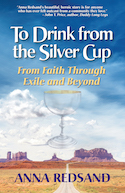
Sponsor Anna Redsand is coming to Seattle to do a reading, and discussion with Ann Przyzycki, the editor of Isthmus, about publishing. This event, on December 3rd, will be a great resource for writers interested in publication from the author and publisher's perspective, as well as doing a DIY book tour, and the kinds of challenges faced by writers and publishers.
Redsand is also supporting her book To Drink From the Silver Cup: From Faith Through Exile and Beyond. You can read the Prologue from the book on our sponsor's page, it's a great investigation into faith, coming out as who you truly are when those around you might exclude you because of who you are, and how to find community and faith by expanding your world view. More details on all of this, the reading and the book itself, on our sponsor's page.
Sponsors like Anna Redsand make the Seattle Review of Books possible. Did you know you could sponsor us, as well? Get your stories, or novel, or event in front of our passionate audience. We only have two dates left in our current block. Take a glance at our sponsorship information page for dates and details.
Scenes from the Indies First party bus tour
On Saturday, Sherman Alexie rented a party bus, stuffed it full of 24 Seattle-area writers, and led the charge to three Seattle-area bookstores. It was an ambitious broadening of the Indies First program that Alexie originated in Seattle a few years ago, in which authors serve as "guest booksellers" at independent bookstores on Small Business Saturday. And the scaling up of the concept required a few sacrifices: some of Seattle's smaller bookstores couldn't physically contain a swarm of 25 authors at once, for instance, and the sheer amount of time it takes to get a group that large around town limited the number of bookstore visits that were possible. So the party bus tour was held to three stops: Seward Park's new Third Place Books, University Book Store, and Elliott Bay Book Company. (Many other Seattle bookstores, incuding Open Books, Seattle Mystery Bookshop, and Phinney Books celebrated Indies First with their own slate of author-booksellers.)
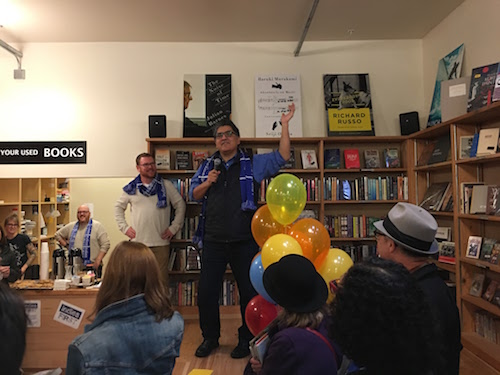
A few of the authors on the party bus had not yet visited Third Place Books' new Seward Park location, and they each came away impressed both by the beauty of the store and by the avid community of readers who've already made the store their home away from home. As the first stop of the day, there was a general nervousness among the authors about what was expected of them at Third Place, but everyone quickly came around: they just had to talk about their books and recommend other recent books that they especially loved. Even a bus packed full of avowed introverts could manage that.
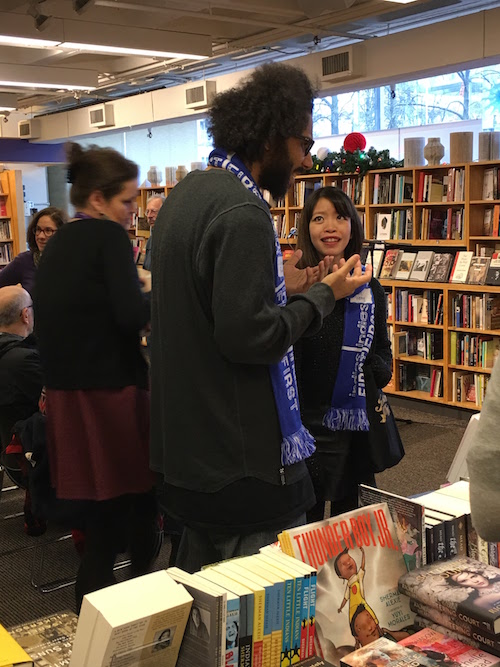
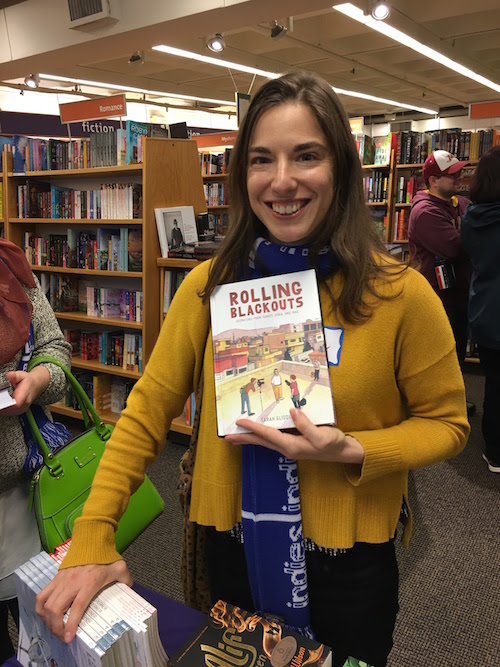
University Book Store is home to some of the longest-serving booksellers in Seattle, and that experience showed: authors were greeted like old friends. The space that the store had set aside for the Indies First visit was next to the poetry section, which kicked off a number of great discussions about poets. Resident party bus poets Quenton Baker and Jane Wong threw around quite a few recommendations.
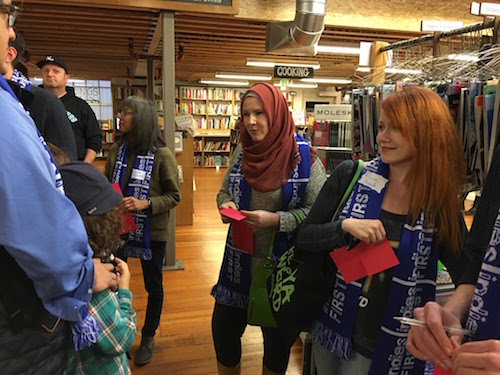
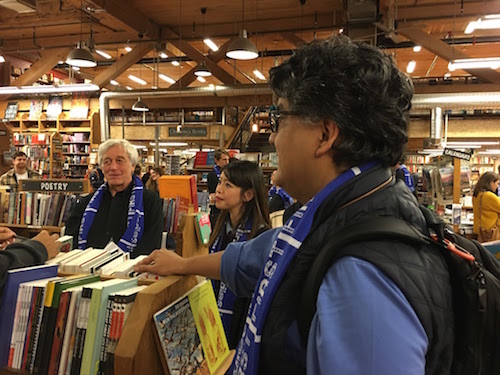
At Elliott Bay Book Company, the authors were greeted with applause. Alexie brought a voracious young reader to G. Willow Wilson and Richelle Mead for some recommendations. Soon enough, they were leading the girl to the sci-fi section to introduce her to the work of Mercedes Lackey. In the poetry section, Alexie led a discussion about literary reading horror stories with young writers. The writers filled out recommendation cards for Elliott Bay's shelves, and they were egged out of their end-of-day weariness by Elliott Bay's exuberant young staff.
By the time the party bus pulled in to the parking lot where the journey began, authors who had never before met were hugging and promising to keep in touch. Several expressed a whole new level of respect for booksellers — if they were this exhausted after three hours of recommending books, they reasoned, anyone who can do this all day must possess some kind of superhuman ability. Bookselling isn't easy.
After 40 years, Rick Simonson is still representing the best of literary Seattle

So far as origin stories go, no superhero ever had a better one.
Rick Simonson was working in the kitchen of a restaurant called Das Gasthaus on Occidental Ave in Pioneer Square. A transplant from Nebraska, Simonson was unsure exactly what he wanted to do with his life, but for the moment he needed a job and the kitchen’s trash needed taking out. As he was lugging out the garbage, Simonson noticed a warm glow from an open door at 109 S. Main St, and so he set down the trash can and peeked inside. He didn’t know it then, but that was a moment that would forever establish the arc of his life.
Inside, Walter Carr was putting books on the shelves of his new business, a bookstore he was calling Elliott Bay Book Company. Even now, Carr tells me, he clearly recalls the moment he first set eyes on Simonson. “Rick, in his very exuberant style, came in and said, ‘wow, a bookstore? I love books!’” Simonson hung around the bookstore for the next few years, working construction and helping seasonally, and nobody was surprised when — 40 years ago this month — he became a full-time bookseller at Elliott Bay.
Carr says Simonson immediately started agitating for Elliott Bay to start a reading series. “From the get-go, we had done events,” he explains, “but we were a one-room bookstore — we had no space to do readings. As the store grew, he kept campaigning for it.” Finally, in fall of 1984, the store had grown enough to incorporate a readings space and Simonson launched the first reading series with a slate of six writers including Ivan Doig.
Simonson kept building outwards from there. “He organized, communicated, and developed a reputation that eventually extended around the world,” Carr says. In the beginning, Simonson focused on young authors who had not built their reputations yet. “I think Amy Tan had her first reading at Elliott Bay,” Carr says, “and she had an upset stomach because she was so nervous.” Through his reading series and his advocacy, Simonson encouraged the careers of young writers like like Louise Erdrich, Raymond Carver, Tess Gallagher, Tom Robbins, and Terry Tempest Williams.
Without Simonson, it’s likely that Seattle would not have the literary reputation that it enjoys today. The reading series that he created — within a couple of years, the series ballooned from a few events a month to a few dozen to a few hundred a year — made Seattle a destination, and the care that Elliott Bay gave to its visiting authors made them intensely loyal to the store. Authors like Kazuo Ishiguro, Arundhati Roy, and Michael Ondaatje have returned to Elliott Bay again and again throughout their literary careers. Novelist Mona Simpson once told John Marshall at the Seattle Post-Intelligencer that “Even writers who hate to travel want to go to Seattle” because of Simonson. He brought Salman Rushdie to Seattle at the height of his fatwa-induced seclusion, and Haruki Murakami’s 1997 Seattle reading — a rare stateside appearance from the novelist — only happened because of Simonson’s tenacity.
Without Elliott Bay Book Company’s reading series, which Simonson spent years dreaming up and then still more years cultivating into a world-class program, it’s hard to draw a direct line from the publishing industry in New York City and the relatively obscure pioneer city of Seattle. His passion and his hard work put our city on the literary map. Sonny Mehta, the celebrated editor-in-chief of the prestigious publisher Alfred A. Knopf, told Paula Bock of the Seattle Times in 1997 that Simonson reads as carefully and “as well as any of the colleagues I have in New York, so I have the highest respect for him.”
Chris Higashi, who recently retired as program manager at the Washington Center for the Book, would go a step further. She believes that Simonson helped create the idea of the modern book tour. When Elliott Bay Book Company started their events series, she says, tours “just weren’t happening like that.” She credits Simonson with coming up with “the idea that booksellers could sell more books if they put authors and book buyers together,” and then working with publishers to make those trips worthwhile.
Carr says that Elliott Bay’s reading series became such an asset that at one point Amazon.com founder “Jeff Bezos became very interested in the author series and made some overtures. He talked about trying to coordinate somehow or, as he put it, ‘help’ with the author series.” Carr and Simonson politely declined Bezos's “help.”
New booksellers at Elliott Bay are taught that there’s no such thing as a small reading; even if only two people show up for an event to celebrate a debut novel from a young author, that reading is a worthwhile investment because that author could become the next Michael Chabon or Jhumpa Lahiri, and those authors would likely keep coming back to the store, book after book, year after year. It’s happened hundreds of times over the last four decades; authors stay loyal to Simonson because Simonson was loyal to them.
If you’ve attended more than one reading in Seattle, odds are good that you’ve seen Simonson pushing around a dolly stacked high with boxes of books, and you’ve probably heard at least one of his introductions, which Seattle author Sherman Alexie affectionately described to me as “rambling, soft-spoken, tangential, erudite, affectionate, and odd.” Simonson is remarkably humble, always preferring to give the spotlight over to someone else.
But if you were to attend the annual Book Expo America industry gathering in New York City, you’d see a different side of Simonson: the man is a rock star. When walking the floor at the Javits Center, Simonson often can’t get more than fifteen feet without being accosted by some publisher, author, or big-name editor. As a young bookseller, I once followed Simonson for an afternoon at BEA and I still recall the fevered tenor of a seasoned New York publicist’s voice as she shouted “RICKEEEEEEE!” and ran across the floor at him, basically tackling Simonson in the hopes of pushing an advance copy of a book by a young author into his hands.
Above and beyond the reading series, Simonson is a passionate reader. “Rick has always had a galley waiting for me when I come to the store,” Alexie says. “He's always got a book in mind for my wife and kids, too. And I know he's always ready with a book for other customers — the civilian readers — and not just writers and the families of writers.” Higashi notes with a kind of wonder that Simonson is “still able to delight in finding a new author and a new book.”
When she and Bill Gates Sr. were still dating in the mid-1990s, Mimi Gates recalls that she asked Simonson to help her choose five books about love to give him as a Christmas gift. She recalls the sincerity and thoughtfulness that Simonson put into the effort. Ever since, Gates has relied exclusively on Simonson for recommendations: “His ability to really think deeply about what somebody else is going to enjoy is really magnificent,” Gates says. Because Simonson has been such a wonderful bookseller, Gates tells me that “to this day, I won’t touch a Kindle. Rick would never make me feel obligated or guilty even if I had one, but I am so loyal to him that I will only buy books from Elliott Bay Book Company.” She calls him “one of my favorite Seattleites.”
Seemingly as soon as Simonson established Elliott Bay’s reading series, he began reaching outward into the community. He has always encouraged readings that incorporate Seattle’s African-American and Asian-American communities. In 1999, when Capitol Hill’s Red and Black Books closed, Elliott Bay hired Red and Black bookseller Karen Maeda Allman to work with Simonson on community programming. Allman and Simonson sell books at any number of events around town including Hugo House readings, the Seattle Asian Art Museum’s Saturday University Lecture Series, and the Northwest African American Museum’s reading series.
Alexie praises the fact that “Rick was reading multiculturally and internationally back in the early 90s, long before it was a popular thing to do. He's always been an innovative reader.” In 1988, Simonson guest-edited a Graywolf anthology on the importance of multicultural reading. In 2013, when Simonson was a judge for the National Book Award, several people recall Simonson being honored to serve the NBA, but a little flummoxed because the intensive reading list requirements meant that he wasn’t able to read internationally as much as he’d like.
Simonson has contributed to communities outside of the bounds of Elliott Bay, too. Both Higashi and Gates recall the way Simonson coaxed them to join him on the board of a fledgling Port Townsend nonprofit poetry publisher called Copper Canyon Press. Higashi remembers that when he gave her the pitch, “I said ‘Rick, there’s a problem: I don’t read poetry.’ And he said, ‘well, but you’re a reader.’ He had that instinct and it changed my life. I became a really passionate reader of poetry because of that.” Gates thinks Simonson recommended her for the board because “He thought I knew the publishing business, but I didn’t.” Still, something must have worked: Gates remains on the board to this day.
Central District Forum founder Stephanie Ellis-Smith tells a story about a different kind of board recruitment strategy. In 1999, she was meeting with someone in Elliott Bay’s basement café to discuss her plans to create an organization dedicated to “contemporary African-American culture, humanities, and performing arts.” Simonson was staging the reading room for that evening’s event, but he became distracted by Ellis-Smith’s aspirations.
“Rick had sat down near us,” she says, “and he heard me talking about what I wanted to do with CD Forum. He commandeered the table; he was clearly now in charge. He said, ‘well, tell me what you want me to do because I’ll be on your board.’” Ellis-Smith was new to the city, and she was taken aback by this stranger’s enthusiasm. She recalls, “I said I reserved my right to hold off that decision until I learned more about him.” Then she did her research, and she notes, “Rick’s been on that board ever since — he was there with me, and he’s still on it even after I retired.”
As a board member, Ellis-Smith says Simonson has done nothing but good for CD Forum. “He was indispensable in helping me chart the course through our programming,” she says. “He took his fundraising responsibilities very, very seriously — still does. He has such a strong following and so many people have such respect for him that it was a blessing to have the imprimatur of Rick Simonson. That went a long way for us.” Gates agrees that on Copper Canyon’s board, Simonson has a “broad base of knowledge” that helps the publisher make contact with new communities. At meetings, Gates says, he “doesn’t speak often, but when he does it’s well-taken.”
Since 2000, Simonson’s attentions have extended outward as he’s shifted from a nationally known literary figure to an international one. Simonson has represented the US at literary events in China, Palestine, the United Arab Emirates and, most especially, the Jaipur Literature Festival in India, which he attends every year.
Simonson has always been a fierce advocate for international literature. He shepherded an agreement between India publisher Seagull Books and the University of Chicago Press to distribute their books in the US. “He has brought back books and authors from India that have not been published here,” Higashi says. “He’s extremely well-known among the heads of the Indian publishers.” Simonson was an early advocate of Anuradha Roy, the DSC Prizewinning author of Sleeping on Jupiter, importing copies of her earlier novel An Atlas of Impossible Longing and selling it at Elliott Bay when no American publisher would step up.
Higashi attended Jaipur with Simonson one year, and she says “I saw him do the same thing in India that he does here: You’re in his circle and he stops to introduce you to each person. He remembers all those names.” (Everybody I’ve talked with for this article expressed wonder at Simonson’s memory; he seems to be able to recall names and phone numbers with photographic precision.) In Jaipur, Higashi says, “I watched people respond to him there that I see the way people respond to him in the publishing world in the US. He does it all with such modesty and such generosity.” Ellis-Smith agrees that “Rick belongs and fits in wherever he is because he’s such a true and authentic person, whether he’s hobnobbing at the National Book Awards in a tux or if he’s lugging books back from some event across town.”
This month, Elliott Bay Book Company booksellers will quietly celebrate Simonson’s 40th anniversary as an employee. There won’t be a big, star-studded party, or a series of teary speeches. Instead, they’ll just keep doing the work, side-by-side, connecting authors and readers, bringing Seattle communities together, and sharing stories from hand to hand.
Everyone I talked to for this piece remarked on Simonson’s humility, his eagerness to pass the microphone to others. “I think Rick has changed very little in his personality in the time that I have known him,” Higashi says, “in the sense that he’s never made this work be about him.” Gates agrees: “he never promotes himself.” Alexie concludes, simply, “I love the dude.”
Simonson has been acknowledged for his hard work. In the late 1990s, he received the Nancy Blackenship Pryor Award from the governor of Washington, which cited his “passion” and “generosity,” as well as his support of “authors for their talents rather than their ability to sell.” He has been the subject of profiles in just about every major Seattle-area publication. But none of those accolades seem to fully encompass Simonson’s role in the history of Seattle’s ascendance. The city has grown with and alongside Simonson — from an enthusiastic little town to a city of national importance to a player in the global community.
“When you go to a reading, there is a sense of that kind of conversation that is integral to a sense of community and a sense of place,” Simonson told Seattle magazine’s Nicholas O’Connell in a 1996 profile. Few people have been as integral to Seattle’s sense of community and place over the last forty years than Rick Simonson.
The Sunday Post for November 27, 2016
How Visionary Chef Sean Brock Nearly Went Blind
Sean Brock is a James Beard-winning chef with a string of successful restaurants, a killer guitar collection, and a connoisseur's taste for bourbon. He also has a little-understood condition that's stealing his eyesight—and the cost goes up each time he walks into a kitchen. This profile by Brett Martin is heartwrenching, and telling about what we value.
There are approximately 16,000 photos on Brock's iPhone. By rough estimation, about 10 percent of those are of various iterations of matsutake and cobia. Another 20 percent are of Ruby, his French bulldog. And the rest are of eyes.
There are bruised eyes. Battered eyes. Eyes leaking actual tears of bright red blood. There are eyes with stitches and eyes with bandages. Eyes drooping as though dragged down by fishhooks and eyes goggling in a grotesque simulation of surprise. Eyes hidden behind patches, shielded by stained gauze, buried beneath great sockfuls of ice.
All of them are Brock's eyes.
Mourning Through Horror Movies
Aaron Orbey on how terror on the screen keeps real-life horror at bay.
We say of most tragedies that enough time will distance us. As the years have elapsed, I’ve continued searching for the worst I can witness onscreen, testing myself with images of agony that seem crueller than my own, worlds in which the unthinkable is valid. I’ve never gotten around to seeing “Forrest Gump,” but I’ve savored “The Forest,” in which an American woman tracks her troubled twin sister to the haunted woods of Aokigahara. “Snow White and the Seven Dwarfs” is still on my list of films to see, but I rather liked “Dead Snow,” in which Nazi zombies terrorize seven Norwegian vacationers on the slopes of Øksfjord. No carnage can startle me these days, but smaller sights—a toddler asleep, slanted on his dad’s chest—might bring me to tears. When I Google my father, the Turkish word for murder auto-fills after his name.
When Not to Translate
Tim Parks rejects the chance to translate the Decameron into modern English in deference to a colleague who's been dead four hundred years. A smart and self-deprecating poke at the assumption that modern translations are best for the modern ear.
Reading this, I experienced exactly the pleasures I feel reading Boccaccio in Italian. Albeit nearly three hundred years after the original was written, Florio still moves in a world where the whole thing makes sense, doesn’t need to be quaint. And he is a supreme stylist too. He can find exactly the idiom in the English of his time. However good a translator might be today, I doubt whether the same level of conviction is possible. Certainly, I didn’t feel I could achieve it.
Why we're saying 'white nationalism' instead of 'alt-right'
Still in post-election shock, the media is in a frenzy of self-examination, both defensive and recriminatory, over its role in Donald Trump's victory. Here are two very different takes.
First, an excellent dive into how fake news gets created from the New York Times. It's easy to demonize social media, but any digital enterprise that drives profit through clicks should be thinking just as hard about its ethical firewalls as its paywalls right now.
Second, an example of exactly the right kind of soul-searching from Seattle NPR station KUOW, on the decision to reject the term "alt-right":
Yiannopoulous insists that just 2 to 3 percent of people identifying with the alt-right are truly racist. But others who identify as alt-right disagree with him – they are REAL racists, they repeat, who don’t like Jews and don’t believe in the Holocaust. They have ridiculed Yiannopoulous, who is gay, and whose mother is Jewish.
Which is why we are avoiding "alt-right" in favor of white supremacy or white nationalism.
Her Code Got Humans on the Moon—And Invented Software Itself
On a happier note, Margaret Hamilton, the software engineer whose code helped take Apollo to the moon and back, was honored with the Presidential Medal of Freedom this week. In a detailed piece from last year, Robert McMillan tells the story of Hamilton's last-minute save:
Right around Christmas 1968—five days into the historic Apollo 8 flight, which brought astronauts to the moon for the first-ever manned orbit—the astronaut Jim Lovell inadvertently selected P01 during flight. Hamilton was in the second-floor conference room at the Instrumentation Laboratory when the call came in from Houston. Launching the P01 program had wiped out all the navigation data Lovell had been collecting. That was a problem. Without that data, the Apollo computer wouldn’t be able to figure out how to get the astronauts home. Hamilton and the MIT coders needed to come up with a fix; and it needed to be perfect.
Bamboo Renewal: Designing a modern bamboo home in Haiti - Kickstarter Fund Project #47
Every week, the Seattle Review of Books backs a Kickstarter, and writes up why we picked that particular project. Read more about the project here. Suggest a project by writing to kickstarter at this domain, or by using our contact form.
What's the project this week?
Bamboo Renewal: Designing a modern bamboo home in Haiti. We've put $20 in as a non-reward backer
Who is the Creator?
Swoon / The Heliotrope Foundation.
What do they have to say about the project?
Together with a village in rural Haiti, we will design and build a home that brings an ancient building material into the present.
What caught your eye?
A non-literary project today. Brooklyn-based street artist Swoon (Caledonia Curry) went to Haiti after the 2010 earthquake, and worked with local artists, architects, engineers, and builders to create a community center for the village of Comiers. It was a huge success — using adobe, and other traditional building materials — and created shared structures that could withstand hurricanes and earthquakes.
In the years since, working with local farmers, and training residents in construction, the foundation has built another house, as well as run arts education projects with the residents. Now, Konbit Shelter is turning its attention to building a home for Louisiana Pierre Louis. Louis lost her son and daughter-in-law in the earthquake, and their kids, her grandchildren, have returned from Port Au Prince to live with her.
It was the community that choose her as the best possible recipient for the house — and one thing that is impressive about the way that Konbit Shelter doesn't helicopter in with solutions — they go and work with the community on what their needs are, and then bring in thoughtful design and architecture to address them.
Why should I back it?
Because it's a great idea, a great project, and they need help making the finish line. Spend a few bucks that will make you feel good, today.
How's the project doing?
54% funded, and 17 days to go. Pitch in, and help them make their goal!
Do they have a video?
Kickstarter Fund Stats
- Projects backed: 47
- Funds pledged: $940
- Funds collected: $740
- Unsuccessful pledges: 2
- Fund balance: $100
No Help Desk Today
Cienna Madrid is taking the day off to relax, and recharge, and maybe do some karaoke. Her column will return next week. As always, if you have any writing, reading, or bookstore etiquette questions, please send them to her at advice@seattlereviewofbooks.com.
And in the meantime, I have some advice for you. I'm not a professional advice-giver like Cienna, but here's my best shot:
If you're working on your NaNoWriMo novel this weekend and you're having trouble getting through the home stretch, give your protagonist amnesia. This will, at the very least, fill up a lot of space as your character re-learns who everyone is and what the hell is going on. It might even help you realize what your novel is really about. And when NaNoWriMo is over, you can just edit out the amnesia if it doesn't work.
If you're working in a bookstore this weekend, know that you have my great respect. I've been there; I know Thanksgiving weekend is a draining time, emotionally and physically, for retail workers. But at least you're working with books! And you're sharing books with others. Every new transaction is an opportunity to change someone's life for the better. That's a terrific responsibility.
If you're feeling anxious or scared about the election and the upcoming inauguration, know that you're not alone. We can get through this together. Reach out to someone if you think you can't handle it. We need you.
If your family is driving you crazy this weekend, we've all been there. Maybe read a book for a while? That's always worked for me.
We'll see you back here this weekend for our regular columns.
It's Thanksgiving in Seattle
Once, over drinks, a friend leaned in so close I could smell the clove cigarettes on her breath, and then she told me the truth. “Living in Seattle,” she said, “is like being madly in love with a beautiful woman who’s sick all the time.”
This was probably fifteen years ago, but it’s one of those moments that juts into the gears of your mind and blows the whole mechanism to pieces. I can’t remember anything anyone else said to me that night at the bar — I can’t even remember who else was there — but I will always remember those words, and the look in her eyes as spoke them to me. She had lived here for a long time, and she was telling the new kid that it wasn’t all long, gorgeous summers and progressive politics. Living in Seattle, she wanted me to know, was work.
I think about her statement a lot. Every time a politician says something dumb, or every time a NIMBY ignores the desperate need for more housing with a plea to preserve a sightline, or every time another report indicates that Seattle is getting less diverse, I think to myself, she’s just sick right now, but one day she’ll feel better. Things will improve.
From before the day I moved here, I knew Seattle would be my home. I tried to live elsewhere, but it never worked. No other place made me want to be a better human the way Seattle does. No other city is this beautiful. No other city is this smart. No other city is home.
But boy is Seattle hard to love, sometimes. This city has excluded poor people and minorities in ways both overt and covert for its entire existence. There’s thankfully very little corruption, but government moves too slow much of the time to address injustice. When our citizenry gets lazy, we can be some of the most passive-aggressive, smug people on earth.
I’ve mentioned recently on this site that I believe the Urban Archipelago concept, the belief that American cities are the last bastion for liberalism and culture, has proven to be disastrous. It has made liberals and progressives worse versions of themselves. The goal of a political party should be to represent all Americans; any political coalition built on just one fraction of the country is a coalition that will not last. (And, yes, the happy news is that this is true of the angry white coalition that Donald Trump built this year, too.)
The truth of 2016 is this: We cannot make do by sheltering in Seattle and keeping our heads down. We can’t just tut-tut at the direction in which the rest of the country is heading. We can’t smugly sit and pass judgment on everyone else. We need to ensure that our policies ensure a place at the table for everyone (barring the bigots and monsters who seek to take rights away from others.) And we need to plan for a future in which we don’t abandon large swaths of this country to molder and rot while the cities prosper.
But all that said, now is the time for Seattle to be strong. We need to provide a sanctuary when other places refuse. We need to encourage and showcase diversity in all its forms. We need to build a place where LGBTQ citizens feel safe to be who they are. We need to shore up the rights that others might want to take away. We must be an example for the rest of America.
I’m not talking about pulling up the gates. In fact, I’m calling for the opposite: this city needs to throw its arms open wide, to demonstrate that being inclusive and thoughtful and just is how America succeeds. That old saying about living well being the best revenge is true; we need to demonstrate that America can house the wealthy and the poor, it can welcome citizens of all faiths and ethnicities and orientations, it can encourage many viewpoints at once. In fact, we are stronger because we include everyone, not in spite of that fact.
On election night, when I had the creeping sensation that I’d fallen into some sort of twisted alternate timeline, it occurred to me that Seattle was really going to have to step up in the next four years. All that high-minded talk, all those dreams we’ve shared over the years but never really lived up to? It’s time to make those real. We are going to have to be the best Seattle that ever existed if we’re going to survive these dark times.
Thanksgiving is a time to collect, and to relax, and to heal. It’s time to surround yourself with love and take stock and plan for the winter ahead. I hope you’ll take a while today, and this weekend, to think about what Seattle can do to thrive in the coming years. What we can do with our privilege to protect those who need help, and to amplify the voices of those who should be heard. And I hope you give thanks for what you have, even as you vow to hold it close and never take it for granted in the difficult years to come.
We got an email from Secret Garden Bookshop's Suzanne Perry explaining the Ballard bookshop's Christmas gift program, and it sounds like a damn good cause:
Through the holiday season, 120 green angels displayed around our shop represent children's names, ages, and their heart's desire in the form of a new book. They've been collected by our friend Michele Bacon, who, for the third year running, has worked in close association with three local schools: Whitman Middle School, Salmon Bay, and BF Day. Michele has spoken to the people in each school who know their kids best, counselors, school/home liasons, teachers and librarians, and together they've identified the kids least likely to receive a new book for the holidays. Then, the school representative has done a bit of investigative work, in order to find out what sort of book each kid would most like if only they could receive one....To fulfill our goal of 120 this year, we welcome our customers to pick an Angel, and choose a book or gift certificate to fulfill the wish. You'll get a discount on the book and we'll wrap it and make sure it gets hand delivered to the proper school before the start of winter recess. Books will be put in backpacks, given to parents, or handed directly to the target kid.
Thanks to Secret Garden for going out of their way to make sure Seattle takes care of its own. Go give them some love this Christmas.
Criminal Fiction: November thanks, and remember to add zombies or psychopaths
Every month, Daneet Steffens uncovers the latest goings on in mystery, suspense, and crime fiction. See previous columns on the Criminal Fiction archive page
Over the past couple of weeks, it’s been a real pleasure to while away several hours in the podcast-presence of Two Crime Writers and a Microphone. UK crime fiction scribes Steve Cavanagh and Luca Veste deliver silly laughs — how about those ducks? — as well as more practical pearls of wisdom, chatting about publishing news (and some non-publishing news, too), hosting book reviewers, and interviewing fellow crime fiction writers like Ian Rankin, Stuart Neville — who contributes the podcast’s twangy-groovy interstitial music — CL Taylor, Craig Robertson, Mark Billingham, and Ruth Ware. You get the feeling that this is how Cavanagh and Veste talk with each other anyway, in private: thanks for turning on the microphone, guys!
Reading around: new titles on the crime fiction scene
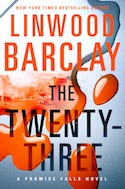
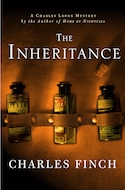
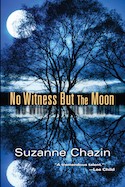
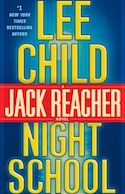
The Quintessential Interview: Justine Larbalestier
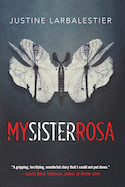
Top five writing tips?
- Always remember no writing advice works for every writer or even most writers. Some writing advice works for no one.
- Add zombies or a psychopath. This works even better than sending in a man with a gun. You can have as many or as few zombies as you like, but never have more than one psychopath: it strains credibility.
- Finish every story you start (unless it’s boring you).
- Read everything from the graffitti on toilet stalls through to the collected works of Zora Neale Hurston (but especially Hurston). Yes, bubble gum wrappers, too. (But please dispose of your bubble gum considerately.)
- Rewrite a lot.
Top five places to write?
Anywhere with an ergonomic set up. I’m broken.
Top five favorite writers?
This list changes not just daily, but probably by the minute. Here’s this minute’s top five in alphabetical order:
- Megan Abbott/Joanna Bourne (because Bourne is to romance what Abbott is to crime thus I count them as one writer)
- Isak Dinesen
- Leanne Hall
- Alaya Dawn Johnson
- Attica Locke
Top five tunes to write to?
I write in silence. Or as close to silence as I can get, which, let’s be honest, in New York City is not very silent. Very loud sirens, even louder construction noises, and the couple next door’s doomed relationship arguments are tragically in high rotation on my playlist. Noise cancelling headphones can only cancel out so much….Top five hometown spots?
I have two hometowns. (Less glamorous than it sounds. You try paying tax in two different countries with different tax years.)
In Sydney:
- My flat’s balcony
- Centennial Park
- Ester restaurant
- Royal Botanic Garden
- Australian Museum
In NYC:
- Tompkins Square Park
- East River Parkway
- Sobakoh restaurant
- Every little community garden in the East Village
- Huertas restaurant
Your Week in Readings: The best literary events from November 23rd - November 29th
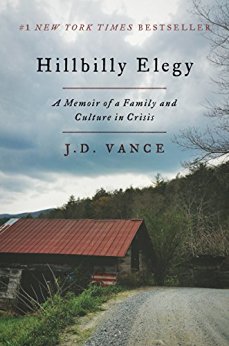
Wednesday November 23rd: Read Hillbilly Elegy
If you haven't already, please start reading J.D. Vance's Hillbily Elegy so you can discuss it with us at our Reading Through It book club, which happens on December 7th at Third Place Books Seward Park.Thursday November 24th: Happy Thanksgiving!
Eat, drink, and try not to think about who's going to be president in less than two months.Friday November 25th: Read a Book You Already Own
Check out of all the Black Friday nonsense by staying home with a book you've bought but not read. Think of it as past you buying present you a gift. Don't go to a mall. Stay home and relax.Saturday November 26th: Indies First Party Bus
See our Event of the Week column for more details. Various locations. Free. All ages. Noon – 5 p.m.
Sunday November 27th: Visit a Library
We still live in a country in which public libraries are open and available to the public. I mean, really: why wouldn't you visit a public library?Monday November 28th: LOUD IDIOTS Reading
Baltimore poet and short story writer Sarah Jean Alexander reads in Seattle for the very first time to celebrate her new book, LOUD IDIOTS. She’s joined by two of the guiding lights of the soon-to-be-nonexistent APRIL Festival, Frances Chiem and Willie Fitzgerald, along with Seattle-area writer Richard Chiem. Vermillion, 1508 11th Ave, http://vermillionseattle.com/. Free. All ages. 7 p.m.Tuesday November 29th: Two Sarahs Read Poetry
Sarah Riggs has written five books of poetry and she’s also also directed films, including Six Lives: A Cinepoem. Riggs has come all the way from New York City to celebrate the latest book of poetry by Seattle author Sarah Mangold, the excellently titled Giraffes of Devotion. Open Books, 2414 N. 45th St., 633-0811, openpoetrybooks.com. Free. All ages. 7 p.m.
Literary Event of the Week: Indies First Party Bus

For decades, American retail employees called the day after Thanksgiving “Black Friday,” but they did so in the stockrooms and break rooms of their stores, away from customers. Managers used the term because Thanksgiving weekend sales are what typically drive a store’s yearly profits into the black. Ground-level employees called the day “Black Friday” because it was so brutal it could kill you.
At some point, “Black Friday entered the popular vernacular as the name of an official shopping holiday, and that was when holiday shopping started to get really out of hand; without “Black Friday” as a popular concept, you don’t get Target employees who have to leave their family’s Thanksgiving dinners early so they can open the store for a bunch of ungrateful yahoos who will happily murder their neighbors to get their hands on a deeply discounted flat screen TV.
To counter the grabby bottom-feeding of Black Friday, America’s small business owners pushed the idea of Small Business Saturday, a time for American to skip the mall and give their cash to local entrepreneurs, instead. Small Business Saturday didn’t seize the national consciousness like the concept of a “doorbuster,” but it’s still been a candle of hope and decency against the garish fluorescent strip lighting of corporate American commerce.
Three years ago, Sherman Alexie put a bookselling spin on Small Business Saturday with Indies First. The idea behind Indies First is simple: writers work as guest booksellers in their local independent bookstores on the Saturday after Thanksgiving. The idea took off nationwide, and now it’s become part of the holiday bookstore tradition. The American Booksellers Association chose Lena Dunham to be the public face of Indies First day nationwide, which is an odd choice. With one book to her name and a tendency to publicly make an ass of herself — and I say this as an ardent fan of Dunham’s show Girls and as someone who liked her memoir — Dunham seems like a bad choice for America’s #1 Indie Bookstore Evangelist.
Luckily, Alexie is still holding it down locally. In fact, he’s going bigger and better than ever: this Saturday, Alexie hired a party bus and stocked it full of 24 Seattle-area writers. These are big names, ranging from poets (Claudia Castro Luna, Jane Wong, Quenton Baker) to comics writers and artists (G. Willow Wilson, David Lasky, Sarah Glidden) to writers of fiction (Donna Miscolta, Nancy Rawles, Kevin Emerson) and non-fiction (David Schmader, Steven Barker) and some local book journalists (Marilyn Dahl from Shelf Awareness, yours truly.) The bus will then take the writers to three Seattle-area bookstores, where the writers will spend about an hour recommending books to customers and autographing copies of their own books.
The schedule as it stands right now — barring traffic — is:
12 pm: Third Place Books Seward Park
2 pm : University Book Store
4 pm: Elliott Bay Book Company
Come on out, meet a favorite writer, support a local business, and get a personalized gift for a loved one. After the darkness of Black Friday, it’s a blast of sunshine into the cold heart of commerce.
Work work work work work
Published November 22, 2016, at 12:54pm
Is it possible to sell your soul on a temporary basis? A Seattle memoirist tells all about working at Microsoft, Amazon, and Expedia in the temp economy.
Book News Roundup: Remembering William Trevor, Umberto Eco fights fascism
News broke yesterday that author William Trevor passed away. Literary Hub has a wonderful roundup of audio and visual files of Trevor appearances and remembrances of Trevor by other authors.
Sadly appropriate for our time: Umberto Eco's list of 14 common features of fascism. Here's number seven:
The obsession with a plot. “The followers must feel besieged. The easiest way to solve the plot is the appeal to xenophobia.”
Barnes & Noble is opening a smaller concept store in New York. It has a large upscale restaurant and books that were "chosen by the store's staff." This is not a rare thing if you shop at independent bookstores, but it's new for Barnes & Noble. Hopefully they'll give their employees more agency in buying for their sections around the chain in the future. This is how you get a bookstore that's actually attuned to its surroundings, rather than airlifted in from a home office.
This list of comedy cliches that must be retired is great advice for writers:
As a public service, here are the two boards from the Workaholics writer's room of comedy phrases that need to be retired, started season 2. pic.twitter.com/DHZqhqU5D5
— John Quaintance (@John_Quaintance) November 18, 2016
Did They Even Exist
If a tree falls in the woods
And no one is there to hear it
Does it even make a sound?Alternative version:
If a police officer shoots a black kid
and no one saw the bullet
Is the black kid really dead?If a white man goes on a killing spree is he a terrorist?
Or mentally ill?
Or a wolf in white skin?If the black kid does not get a hashtag
were they really killed?
Are they worthy of mourning?If no one knew the black kids name
were they even a person
or just a target?If no one comes to the black kids funeral
Is their mother still crying?If the black kid does not make the evening news
did they even
exist?
An adventure in Northwest waters

Our inspiring sponsor, Susan Marie Conrad, did something many of us want to do, but almost nobody does: she kayaked the entire Inside Passage, from Anacortes to Juneau, Alaska. You and I both know this story is more than just the logistics of paddling, and Conrad delivers a great story in her book Inside: One Woman’s Journey Though the Inside Passage. It's well-told, rife with personal accomplishment, and that kind of self-examination that only comes from pitting oneself against nature.
We have a long, engaging excerpt on our Sponsors page. Please give it a read, and see a few pictures from the trip, as well. If you're like us, you'll want to click through and read the rest of the story. We hope you do.
Sponsors like Susan Marie Conrad make the Seattle Review of Books possible. Did you know you could sponsor us, as well? Get your stories, or novel, or event in front of our passionate audience. There are some dates open perfect for pitching your product for the holidays. Take a glance at our sponsorship information page for dates and details.
Chaim Gartenberg at The Verge writes about the really neat idea behind Recommendmeabook.com:
Designed by developer Givi Phirtskhalava, the site presents you with the first page of a novel as a blank, standalone item without title, author, or cover, allowing you to experience the beginning of a book without coloring it with any preconceived ideas.
You just read the first page and if you like it, you push a button to reveal the title and author. If you don't like it, you hit the "Next Book" button. Simple. Unfortunately, the site only provides links to Amazon to buy the books, but you know to buy the books from your local independent bookstores instead, right? Right. Go browse for a while.
Shelf Awareness has the scoop about a big change at Bellingham bookstore Village Books:
Chuck and Dee Robinson, founders and owners of Village Books and Paper Dreams, Bellingham and Lynden, Wash., are selling the stores to Kelly Evert, Paul Hanson and Sarah Hutton, the store's senior management team, who have been handling most day-to-day operations for the past several years. The sale is effective January 1.
Evert and Hanson previously worked at Eagle Harbor Book Company. There will be some farewell receptions for the Robinsons at Village Books locations the first week of February.
This is momentous news — during the post-Borders-and-B&N decline of independent bookselling, the Robinsons provided a new model for independent bookstores. And their time as a beacon for indie bookstores has not been forgotten; if you ever attend a bookselling get-together, you'll find that Chuck and Dee are, rightfully, treated like royalty. They've earned the right to step aside, and to pass Village Books on to people who understand the importance of what the Robinsons have built.

